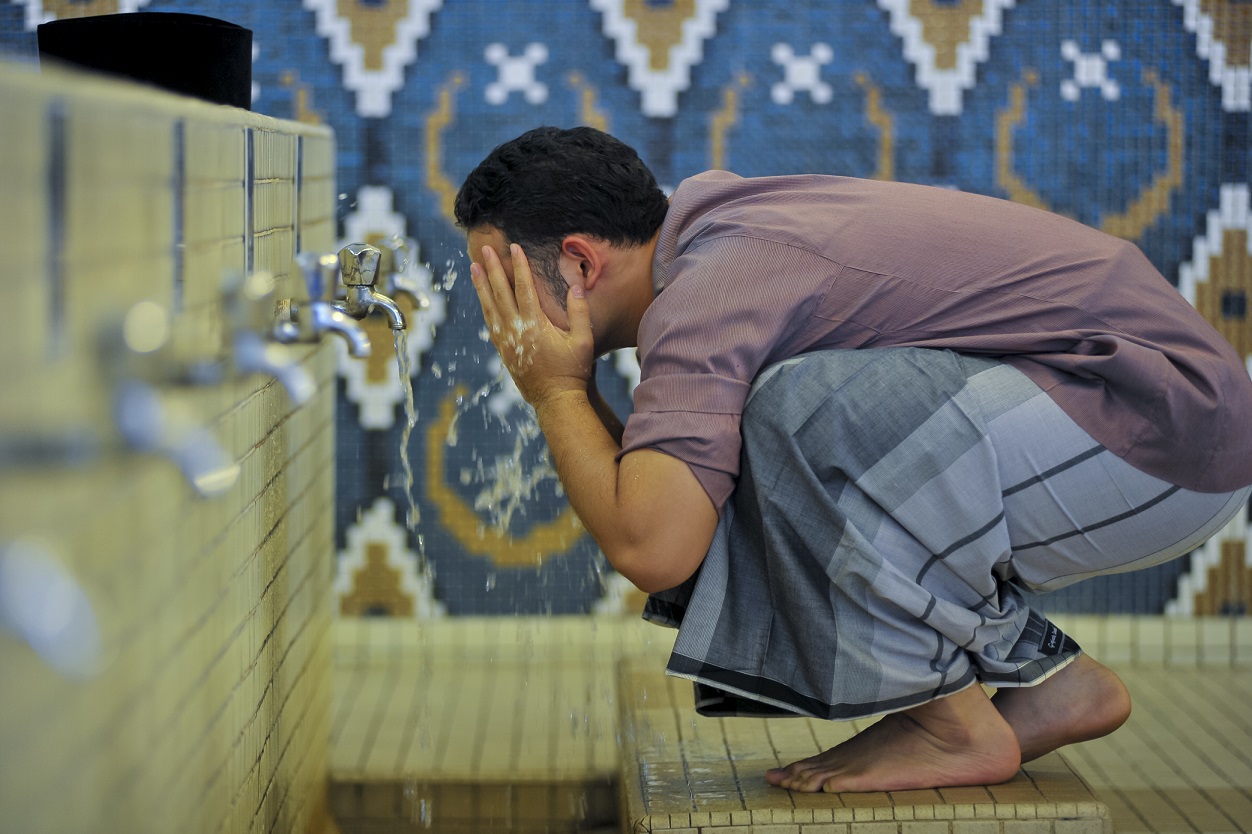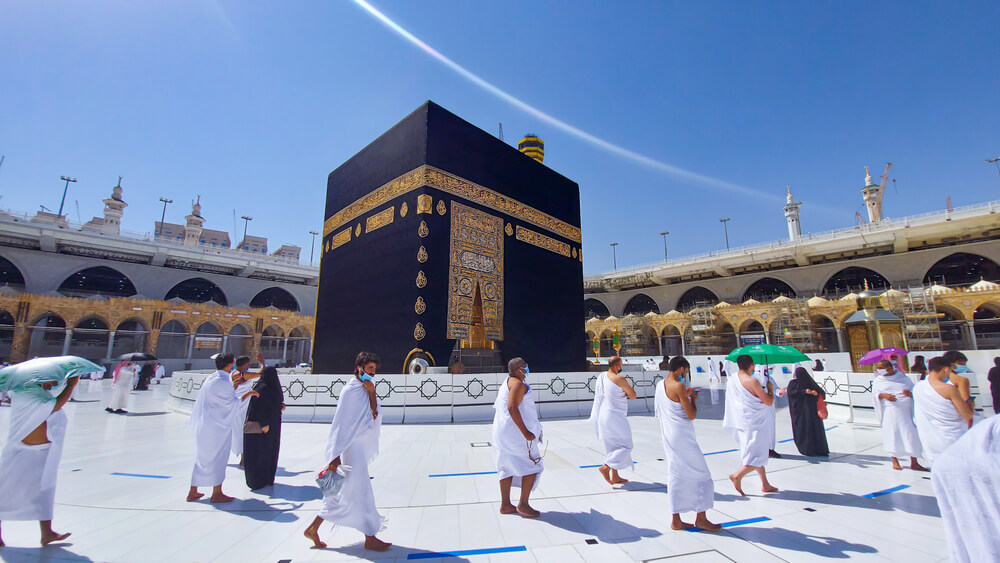Performing circumambulations of the holy Kaaba during Umrah is known as Tawaf. It is a compulsory ritual for all pilgrims aiming to perform Umrah successfully. It is a holy ritual and hence there are number of pre-requisites and duas are associated with it. This blog iterates how to do Tawaf in Umrah, its importance, along with a few dos and don’ts.
Tawaf Meaning
The word Tawaf is derived from the Arabic word Tauf, which means to go round and round in the Arabic language. The literal meaning of Tawaf is ‘to walk around’ or ‘to encircle something’. That’s why the action of circling the Holy Kabbah seven times in an anti-clockwise direction is known as Tawaf.
What is Tawaf during Umrah & its importance?
Tawaf is one of the important religious rituals in Umrah. During the age of Jahiliyyah—that is before the period of Prophet Muhammed (PBUH)—Arabs used to perform Tawaf naked, regarding it as an ancestral ritual. They believed that clothes contain sins and let people trample over them. There are many legends that explain why Tawaf is performed. Scholars give more than one reason regarding the importance of Tawaf and its process. One of the reasons why pilgrims perform Tawaf in one direction in a circular fashion is that it symbolizes their belief in the one and only Almighty Allah.
While some equate each circumambulation around the Kaaba as a step towards the seventh sky, others understand it as a surrender to Allah and devoting oneself to worship with all their heart. One of the important contexts for seven circumambulations is found in the narration of Ibn ’Abbas. He mentions that when Prophet Ibrahim left his wife Hagar and son Ismail in Makkah, they soon ran out of food and water. In a bid to find water for her thirsty son, Hagar ran up and down the Safa and Marwa hills looking for water. That explains why circumambulating the Kaaba seven times is an important ritual of Umrah and Hajj both.
Types of Tawaf
Even though this blog is about Tawaf-al Umrah, here is a quick look at fives types of Tawaf. Each of them are performed in a different way and serve a unique objective.
- Tawaf-al-Umrah
- Tawaf-al-Qudoom (performed as part of Hajj Al Tamattu)
- Tawaf-al-Ifada
- Tawaf-al-Widaa (farewell Tawaf, performed by those coming from beyond the miqats)
- Nafl Tawaf
Rules of Tawaf
While performing Tawaf, it is important to follow the below rules:
- One should be in Wudu state during Tawaf.
- Also, it is important to perform Niyyah for Tawaf.
- Pilgrims should start the Tawaf from the black stone.
- Pilgrims must complete circumambulating around the holy Kabba seven times in a counter-clockwise direction.
- Pilgrims should perform Vitr prayer during Tawaf by leaving the circumambulation.
- Once Vitr prayer is offered, pilgrims should return to the performing Tawaf.
- Pilgrims should try to kiss the black stone. If one cannot do so due to the crowd, they can touch the stone and kiss the hand for the blessings.
- Further, one can also point in the direction of black stone if unable to reach the stone and say, ‘Allahu Akbar’.
How to perform Tawaf during Umrah?

- The first thing to do in Tawaf is to make Wazu (ablution). Wazu can be done on the premises of Holy Kabbah or can be done from the place one is staying at.
- For Tawaf, the prescribed attire for all pilgrims is called Ihram. It should be pure and it should cover your satar (the parts of body that should be covered according to Islam). Ihram for men should consist of two unstitched white cloths wrapped around the body. Whereas Ihram for women consists of simple clothing which covers the satar and a hijab (veil). Women are not allowed to cover their faces.
- Then the pilgrim should enter the Mataaf, or the area in which pilgrims perform Tawaf in Makkah; it is the surrounding area of Kabbah.
- Pilgrims should perform Niyat (intention) in front of Hajre-Aswad, a black-coloured stone sent from heaven to Prophet Ibrahim (PBUH) while he was building Kabbah. It is placed in the eastern corner of Kabbah.
- After performing the Niyat, one should face Hajre-Aswad and recite Takbir (Allahu-Akbar) and kiss the stone.
- Then he/she should start walking in the anti-clockwise direction around the Kabbah. An individual should complete seven rounds on foot in this manner. The Tawaf must be completed in one go and the pilgrim should not leave until all seven rounds are completed.
- Once the seven rounds are completed, the pilgrims must stand in Al-Masjid Al-Haram and pray two rakats.
- After that, they must drink water from the Zamzam while reciting the dua.
Best time for Tawaf
There is no best time for Tawaf, specified anywhere however there are some suggested times that allow one to complete the circumambulations in peace. This is specifically around the sunrise, a little after Zuhr prayer. Especially if you are with senior citizens and children, this is the time when the heat is bearable and the mataaf is relatively less crowded.
Must Read: How To Offer Zuhr Prayer, Meaning Of The Prayer, And Benefits
How many Tawaf should be performed during Umrah?
As a single, Tawaf is walking seven times around Kabbah in the anti-clockwise direction. A pilgrim is free to do as many Tawaf as he/she wishes to do before proceeding for Sa’i (walking between the hills Safa and Marwah as a ritual in Umrah). It is believed that a person can perform Umrah on behalf of another person who is either dead or is not present in Makkah at the present.
Tawaf Dua for Umrah
There is no obligation on duas to recite during Tawaf. One can read the verses from the holy Quran, take the name of Allah or can recite personal duas in any language. However, there are some recommended duas one should know about while circling around the holy Kaaba. These duas are mentioned below:
1) Dua for the first turn:
“Allahumma as’aluka bi ismikal ladhi yumshi bihi ‘ala talilil mai kala yumshi bihi ‘ala judadil ardhi; as’aluka bi ismikal ladhi yahtazzu lahu ‘arshuka; wa asaluka bi ismikal ladhi tahtazzu lahu ‘arshuka; wa as’aluka bi ismikal ladhi tahtazzu lahu aqdamu mala’ikatika; wa asaluka bi ismikal ladhi da‘aka bihi Musa min janibit tūril ayman, fastajabta lahu walqayta ‘alayhi muhabbatan minka; wa as’aluka bi ismikal ladhi ghafarta bihi li Muhammadin la taqaddama min dhanbihi wa ma ta’akkhara wa atmamta ‘alayhi ni‘matuka – an tarzuqani khayrad dinya wal akhirah.”
Translation:
“O Allah! I call on Thee by They name, by which it is walked on the waves of the seas as it is walked on the roads of the land, And I call on Thee by Thy name, for which Thy throne shakes, And I call on Thee by They name, for which the feet of Thy angels tremble, And I call on Thee by Thy name by which Moses prayed to thee from the side of the Mountain (of Toor) and Thou accepted his prayer and conferred Thy love on him, And I call on Thee by Thy name by which Thou pardoned Muhammad, peace be upon him and his household, all his previous and future sins, and completed all thine blessings for him To provide me with the best of this world and the hereafter.”
2) Dua for the second turn:
“Allahumma inni ilayka faqirun wa inni kha’ifun mustajirun, fa la tughayyir jismi wa la tubaddil ismi; Sa’iluka faqiruka miskinuka bi babika; fa tasaddaq ‘alayha bil jannah; Allahumma, al-baytu baytuk, wal haramu haramuk, wal ‘abdu ‘abduk, wa hadha maqamul ‘a’idhu bikal mustajiru bika minan nar, fa a‘tiqni wa walidayya wa ahlii wa wuldi, ikhwaniyal mu’minin minan nar, ya jawadu ya karim.”
Translation:
“O Allah! I am Thy dependent servant, and I am fearful and take refuge in Thee; so do not alter my body nor change my name. I am your beggar, your poor destitute servant at your gate; so grant me mercifully your paradise. O Allah! The House is Thy House, and the sanctuary is Thy sanctuary, and the servant is Thy servant, and this is the station of him who turns to Thee and takes refuge with Thee from Fire; so save me and my parents, my children and my faithful brethren from Fire, for Thou art the Generous, the Gracious.”
3) Dua for the third turn:
“Allahumma adkhilniyil jannah wa ajirni minan nar bi rahmatika, wa ‘afiniy minas suqmi wa awsi‘ ‘alayya minar rizqil halal, wadra’ ‘anni sharra fasaqatil jinni wal insi, wa sharra fasaqatil ‘arab wal ‘ajam; Ya dhal manni wat tawli; ya dhal jūdi wal karam; inna ‘amali dha‘ifun fa dha‘ifhu li; wa taqabbilhu minni; innaka antas sami‘ul ‘alim.”
Translation:
“O Allah! Grant me the paradise by Thy mercy, and give me refuge from Fire by Thy mercy, and heal me from disease, and enlarge Thy lawful bounty for me, and keep me safe from the evil of the dissolute among the genies and men and the evil of the Arabs and non-Arabs. O Thou bountiful, mighty and munificent! My deed is little, so multiply it, and accept it from me; verily Thou art the All-hearing, the All-knowing.”
4) Dua for the fourth turn:
“Ya Allahu, ya waliyyal ‘afiyah wa khaliqal ‘afiyah wa raziqal ‘afiyah wal mun‘imu bil ‘afiyah wal mutafaddilu bil ‘afiyah ‘alayya wa ‘ala jami‘i khalqika, ya Rahmanad dinya wal akhirah wa Rahimahuma, salli ‘ala Muhammadin wa Al-I Muhammad war-zuqnal ‘afiyah wa tamamal ‘afiyah wa shural ‘afiyah fid dinya wal akhirah. Ya arhamar rahimin.”
Translation:
“O Allah! The owner of well-being, the creator of well-being, the bestower of well-being, the granter of well-being, and the conferrer of well-being on me and on all Thy creatures, O, Thou the merciful of this world and the hereafter and their compassionate God, Bless Muhammad and his household, and bestow on us well-being, full well-being, and thanks giving on wellbeing in this world and the hereafter, by Thy mercy, O Thou most merciful.”
5) Dua for the fifth turn:
“Allahumma atina fid dunya hasanatan wa fil akhirati hasanatan wa qina ‘adhaban nar.”
Translation:
“O our Lord, Grant us Thy blessing in this world and Thy blessing in the other world, and save us from the pain of Fire.”
6) Dua for the sixth turn:
“Allahummal baytu baytuka, wal ‘abdu ‘abduka, wa hadha maqamul ‘a’idhi bika minan nar. Allahumma min qablikar rūhu wal faraju wal ‘afiyah. Allahumma inna ‘amali dha‘ifun, fa dha‘ifhu li; waghfir li mat-tala‘ta ‘alayhi minni wa khafiya ‘ala khalqika; astajiru billahi minan nar.”
Translation:
“O Allah! The House is Thy House, and this is the station of him who takes refuge with Thee from Fire. O Allah! All blessing, relief and well-being come from Thee. O Allah! My deed is little, so multiply it for me, and forgive all that Thou knowest of me but has been hidden from Thy creatures. I take refuge with Allah from Fire.”
7) Dua for the seventh turn:
“Allahumma ‘indi afwajan min dhunūb wa afwajan min khataya; wa ‘indaka afwajun min rahmatin wa afwajun min maghfirati; ya manis-tajaba li-abghadhi khalqihi idh qala andhirni ila yawmi yub‘athūna, istajib li. Allahumma qanni‘ni bima razaq-tani, wa barik li fima ataytani.”
Translation:
“O, Allah! I bear crowds of sins and crowds of faults, and with these are crowds of blessing and crowds of forgiveness. O Thou Who granted the request of Thy most hated creatures when he said “give me respite until the day they are resurrected,” grant me my request. When he said,” Give me time to the day of resurrection, accept from me. O, Allah! Make me content with what you have provided me with, and bless me with what you have given me.”
Things to avoid during Tawaf
During Tawaf in Makkah, several things are considered Makruh (disliked or offensive) and hence must be avoided. They are as follows:-
- Discussing petty and worldly affairs during Tawaf is not allowed.
- Trading of products whether selling or buying is not allowed while a person is performing Tawaf in Makkah.
- In case one gets a phone call while in Tawaf, they are obliged to receive it and answer the person on the phone. However their conversation can not contain earthly matters or trade-related matters as it may be considered as Makruh. It is advisable to switch off your phones while in Tawaf.
- Do not pray or recite the Quran in a loud voice as it can disturb other people performing Tawaf.
- Wearing impure clothes while performing Tawaf is not advisable. Pilgrims must wear Ihram, which are plain white clothes (also unstitched for men) sans any colour, perfume or deodorant.
- To continue Tawaf while Namaz or Khutba (Preaching/Bayan) is ongoing in Kabbah is not allowed.
- Performing Tawaf while being hungry or angry is not advisable. Tawaf should be done with a peaceful and calm mind remembering Allah.
Tawaf Umrah and Hajj are similar in most ways. Tawaf symbolizes unity and equality as people from every corner of the world come together in one place irrespective of their status. It emphasizes spending time in worship of Allah and blossoming as a new personality at the end of Hajj or Umrah.
Suggested Read: Difference Between Hajj And Umrah: Timing, Duration, Rituals And More
Tawaf Al-Umrah Guide FAQs
How many tawaf is required to perform Umrah?
While performing Umrah, devotees are required to perform seven tawaf.
Is tawaf al wida necessary in Umrah?
Yes, tawaf al wida is mandatory for all those who do not reside in Makkah.
How to do tawaf Umrah?
Performing tawaf involves walking seven times around the holy Kaaba in the anti-clockwise direction. There are certain rules that one must follow while performing this ritual.
What to recite during tawaf?
Pilgrims should perform Niyat in front of the black stone before reciting Takbir and beginning tawaf.
What are the rules of tawaf?
There are several rules one must follow while performing tawaf. Devotees must avoid discussing petty affairs, conducting business and reciting prayers aloud during the ritual.
What is tawaf in Islam?
Tawaf is a Fard rite, necessary for completing the pilgrimages of Hajj and Umrah. It involves circling around the Kaaba in counter clockwise direction, seven times, while offering duas and prayers.
Why do we do tawaf 7 times?
While performing pilgrimage, the Prophet (PBUH) mentioned that Muslim must learn the pilgrimage rituals from him. Hence, following in his footsteps, it is important to circumambulate the Kaaba seven times during Tawaf.









